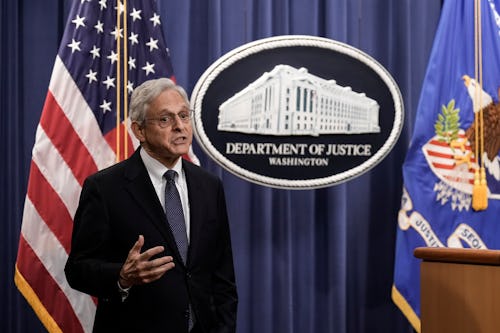
Three days after FBI agents appeared on former President Donald Trump’s doorstep to execute a court-approved search warrant at his Mar-a-Lago resort, Attorney General Merrick Garland finally addressed the unprecedented incident in a brief, if underwhelming, statement Thursday afternoon.
Noting that while the Justice Department had been silent on the search, Trump himself had confirmed it, Garland cited “substantial public interest in this matter” to announce the DOJ’s request to unseal portions of the warrant. The department had filed the request in a Florida court just before Garland addressed the media.
In other words, the thrust of Garland’s hastily called, highly anticipated press conference was to trumpet that he’d merely asked the Southern District Court of Florida to let him do the thing that many hoped he was going to announce he’d actually already done. And while the awkward stutter-step of this whole process is understandable given the largely unprecedented circumstances, the briefing itself ... well, it could have been an email.
Which isn’t to say that there weren’t tantalizing hints of the deeper, as-of-yet-still-secret story playing out behind the scenes here. To begin with, Garland confirmed that he, himself, had personally approved the decision to pursue the search warrant, leaving little doubt that the police action had been supervised at the DOJ’s highest levels while not disproving earlier reports that the Biden White House had been unaware of the raid. (In fact, Biden had reportedly not even known about Thursday’s briefing itself until it had already been publicly announced too.)
Perhaps more interesting, however, is the motion to unseal parts of the warrant itself. In addition to having been signed by U.S. Attorney Juan Gonzalez, the request was also signed by Jay Bratt, head of the DOJ’s Counterintelligence and Export Control section. Bratt, it was previously reported, was one of the Justice Department officials who’d met with Trump’s attorneys this past June regarding the classified material reportedly at the center of the incident. Trump had previously been accused of leaving office with, and potentially still being in possession of, mishandled national security documents.
Trump, who was given his own copy of the warrant, has refused to state what the FBI was after and what they may have removed from his property. Now, by making the request to unseal the warrant public in a carefully watched press conference, Garland has essentially called the former president’s bluff, forcing him to either ascent to letting the allegation against him become public, do it himself with his copy of the warrant, or fight the request in court, thereby exacerbating the sense that he has, indeed, something criminal to hide.
Garland concluded his brief remarks by promising that “more information will be made available in the appropriate way and at the appropriate time.”







